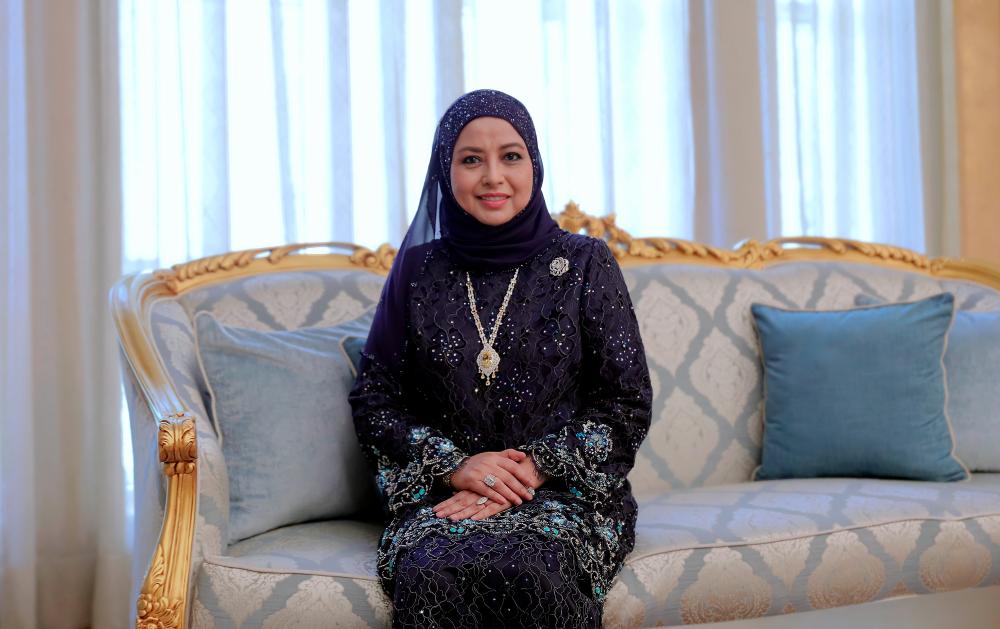JOHOR BAHRU: Like a mother who cares for her children’s future, so is Her Majesty Raja Zarith Sofiah, the Queen of Malaysia, who is committed to prioritising education and the intellectual development of the people, especially the young generation.
The Queen emphasises the importance of education as a vehicle for self-advancement and this is evident with the many programmes inspired by Her Majesty having directly benefitted in the production of quality graduates and also helped develop the local community, especially in Johor.
Universiti Teknologi Malaysia (UTM) vice-chancellor Prof Datuk Dr Ahmad Fauzi Ismail said the establishment of the Raja Zarith Sofiah Centre for Advanced Studies on Islam, Science and Civilization (RZS-CASIS) at the university on June 15, 2019, is evidence of Raja Zarith Sofiah’s commitment to education.
This is because, through the centre, a series of discourses that bring together leading national and international intellectuals have been held with Her Majesty herself giving the keynote address.
One of them was during the “Syarahan Perdana” and the launch of the book “Islam: The Covenants Fulfilled” authored by a world-renowned Malay thinker Tan Sri Professor Dr Syed Muhammad Naquib Al-Attas at the Kuala Lumpur World Trade Centrer (WTC) last year.
“The presence of Her Majesty in this kind of discourse shows her commitment to the field of knowledge, especially in the context of the Islamic world,“ he told Bernama.
Raja Zarith Sofiah has been UTM Chancellor since June 1, 2010.
The establishment of RZS-CASIS aims, among other things, to carry out advanced research on Islam, science and civilisation and to provide expertise in the field of Islamic thought and civilisation.
Her Majesty, who graduated with a Bachelor of Arts in Chinese Studies from the University of Oxford, United Kingdom, is responsible for establishing the collaboration between UTM and the Oxford Centre for Islamic Studies (OCIS), United Kingdom, in May last year in organising the Science Roundtable programme, themed “Imagining the Future: Climate Change, Health, and Food Security in Muslim Societies’.
“This OCIS-UTM programme was organised to discuss sustainable ideas and strategies in dealing with global climate change, especially in the context of the Muslim community.
“It complements other intellectual activities such as the UTM Royal Intellectual Forum, which aims to discuss the moral values of the Islamic economy in the context of challenges and implementation that emphasise justice, equality and sustainability in the face of the digital world of today’s rapidly changing era,“ he said.
In Johor Bahru, Raja Zarith Sofiah is responsible for inspiring the Bangsa Johor Bahagia (BJB) programme, which is aimed at improving the socioeconomic level of the community in the People’s Housing Programme (PPR) area.
The pilot project was carried out for the community at Pangsapuri Kangkar Pulai, here, by the UTM research team in 2018 under the auspices of the Yayasan Raja Zarith Sofiah Negeri Johor (YRZSNJ).
“Through this foundation, Her Majesty contributed and collected funds, as well as equipment, for the implementation of the project.
“The BJB community has become a model and received international recognition, For example, the Flat Kenari Kangkar Pulai community, which was named the winner of the Commonwealth Association of Planners (CAP) Award for Planning Achievement for its Community Farm Project,“ said Ahmad Fauzi.
Raja Zarith Sofiah is also a queen who is concerned for the welfare and well-being of the people, especially students at UTM.
Her Majesty often holds meetings with the university, either physically or online, to ask about them, especially during the Covid-19 pandemic.
With the current conflict in Gaza, Palestine, Her Majesty was concerned with the welfare and mental and physical well-being of the 31 Palestinian students at the university.
The “UTM Chancellor’s Engagement with Palestinian Students” was held last October where the Queen was able to meet the students concerned.
Her Majesty is also committed to helping UTM raise funds to help disadvantaged students and with the operation of the university through the “UTM Royal Gala Dinner”, organised every two years.
The implementation of this program, said Ahmad Fauzi, provided opportunities for government agencies, corporations, industry players and individuals to contribute and carry out social responsibilities, especially for the benefit of students. - Bernama









